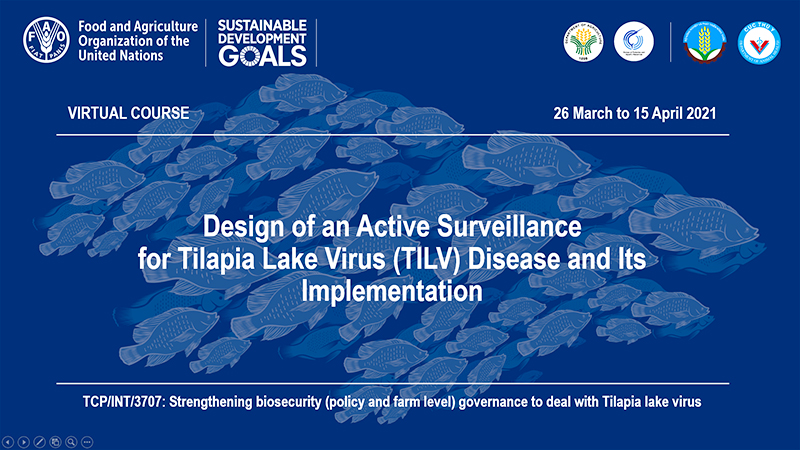 |
26 March to 15 April 2021 |
This training course carried out under the auspices of the FAO inter-regional project TCP/INT/3707: Strengthening biosecurity (policy and farm level) governance to deal with TiLV. Three countries are participating in this project, namely Colombia, the Philippines and Viet Nam. A 12-point checklist in the design and practical application of active surveillance of diseases in aquatic organisms (farmed and wild population) has been developed to serve as a methodological approach and guidance for a multidisciplinary team particularly in countries where surveillance expertise is limited. It is a stepwise and pragmatic approach that offers a good starting point for addressing disease issues especially in developing countries. It can be used as a model to build targeted surveillance competency and a basic reference when implementing a surveillance programme or improving existing programmes. The checklist is based on a review of available main aquatic surveillance references and scientific literature and was further developed based on the outcomes of several aquaculture biosecurity project-related workshops hosted by the FAO (Bondad-Reantaso et al. 2021).
The 12-point checklist includes the following:
- scenario setting;
- defining surveillance objective;
- defining the populations;
- disease clustering;
- case definition;
- diagnostic testing;
- study design and sampling;
- data collection and management;
- data analysis;
- validation and quality assurance;
- human and financial resources and logistics requirements; and
- surveillance in the bigger picture.
For a multidisciplinary team approach to disease control, knowledge of fish biology, aquaculture systems and many aspects of aquaculture health management and biosecurity are required. Surveillance needs significant financial investment and must be supported by adequate diagnostic capability, information system management, legal framework and communication networks, with transparent reporting mechanisms to allow rapid disease response for serious diseases of aquatic organisms. Thus, an appropriate design of the surveillance plan and practical implementation are very important.
The virtual course, that will use a combination of a webinar and moodle platforms, will run for 3 weeks starting from 26 March until 15 April 2021. The virtual course is funded by the abovementioned project with partial support from the Norwegian Agency for Development Cooperation under the project GCP/GLO/979/NOR Improving Biosecurity Governance and Legal Framework for Efficient and Sustainable Aquaculture Production.
Further information can be obtained via email: Melba.Reantaso@fao.org
A list of reference materials is available here.